|
|
 |
 |
|
 |

WMI UPDATE
January/February 2013
wmionline.org
|
 |
Report on 2013 WMI Graduation and Annual Field Trip |
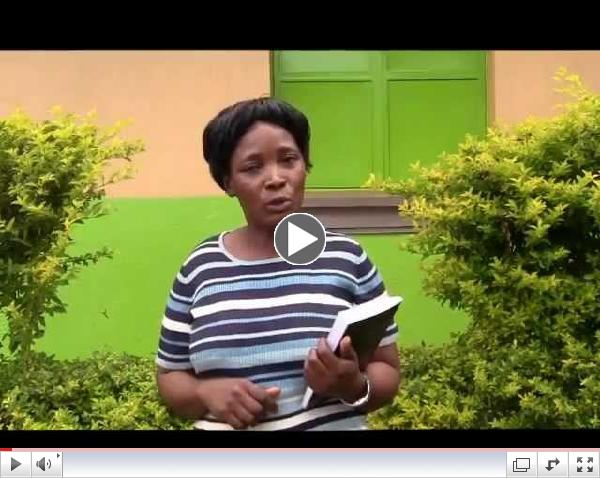 | | Olive Wolimbwa, WMI Local Director, on how WMI has impacted her family |
| |
As the President of WMI, it is my very great pleasure to travel to East Africa each year to review WMI loan hub operations. I am pleased to provide WMI supporters with this update on operations and very happy to report that the loan program and the women we serve are thriving!
Several videos of the graduation and field visits have been posted on Youtube and you can view them by clicking on the thumbnails in the lefthand margin or at: http://www.youtube.com/user/WMIonline:
- Olive's testimony about WMI's impact on her family
- 2013 WMI Graduation ceremony
- Children show how they help with chores and their mom's businesses
- Dncers and drummers welcome at the loan hub in Atiak, Uganda
- Truck traffic through Atiak
 | |
Sally Kelly being honored at the graduation ceremony
|
I was fortunate to have Sally Kelly's company for part of the 5 week trip - Sally is WMI's liaison to the Shikokho Women's Group, which operates the WMI loan hub in Shikokho, Kenya, with support from Chevy Chase Presbyterian Church. Sally spent a week in Shikokho providing infrastructure support and then brought a cohort of eight to Buyobo for a 3 day workshop on loan program operations and a raucous graduation celebration.
 | |
Olive at the WMI building
|
Olive Wolimbwa, WMI's Local Director, continues to provide inspirational leadership for the loan program. On behalf of all the women and families in East Africa that WMI serves, she conveyed her heartfelt gratitude for the loan program. She has assembled a team of 25 able trainers, coordinators and support staff in Buyobo. This team provides guidance to all WMI loan hubs in East Africa.
|
|
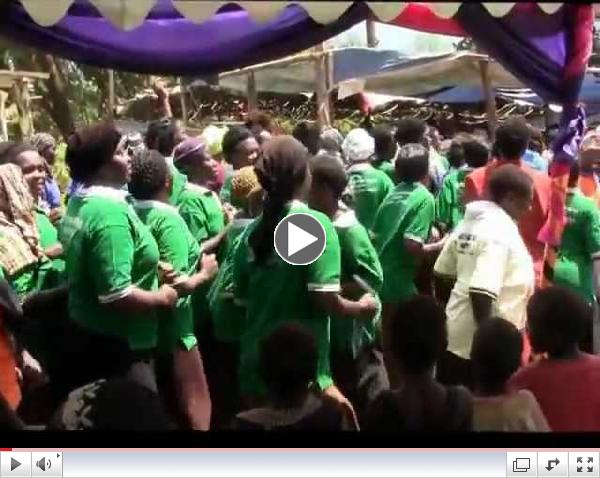 | | WMI Graduation Video Montage 2013 |
| |

Graduation Ceremonies. Both BWA in Buyobo and the WMI loan hub in Bududa (MAWDEG) - WMI's 2 oldest hubs - held ceremonies for the women graduating to bank loans. These were joyous occasions with much singing and dancing and music and marching and speech-making and eating! These annual celebrations honor the hard work and achievements of all WMI borrowers and staff in a very public way. It is their day to shine and enjoy the recognition they deserve for their business determination and success.
Below: It took some really big saucepans to feed the hundreds of guests with food donated by the WMI loan groups

Highlights included a speech by the guest of honor, Topista Nabwire, from PostBank Uganda, one of the only female bank branch managers in Uganda, and a very moving speech by a representative of the Husband's Committee.
|
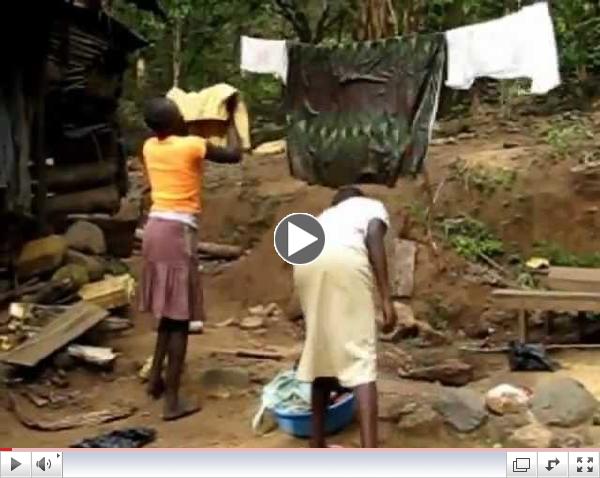 | | A Spotlight on Children of WMI Borrowers |
|
|
Husbands of WMI borrowers formed a committee and elected a representative to testify at the graduation ceremony about the positive impact of the loan program. The representative indicated that the hearts of all the husbands are full of joy because of the achievements of WMI. It was his honor to inform everyone that WMI women are role models for their families and created good working relationships so that their families can achieve their goals. He especially noted that women in WMI leadership travel all over Uganda, Kenya, and Tanzania enjoying new experiences and getting new ideas for themselves and their families. They have become diplomats to spread the word about WMI.
It was a privilege to attend the day long events and deliver WMI's congratulatory speech in Ligisu. Even with the tortured pronunciation, the ladies broke into enthusiastic applause and ululations at: "Mwanyala kusasula loani bulayi" (Thank you for paying the loan well).
Over 500 guests attended the graduation ceremonies - many from other WMI loan hubs and some from other microfinance organizations as far away as Kenya - so that they could get a better understanding of how a grass-roots loan program led by village women can succeed. If you haven't seen the graduation ceremony pictures, check them out on the WMI blog.
 | |
Olive, Jackline Namonye, WMI Ass't Local Director, and head coordinators at graduation
|
Loan Hub Operations. The years WMI has invested in building village-level human capacity and infrastructure are returning dramatic results. The dedicated staff of trainers and coordinators is composed entirely of ladies who are borrowers in the loan program. They organize training for new borrowers in all WMI loan hubs and travel as far away as Tanzania and eastern Kenya. They provide guidance and leadership for all program operations. Other loan hubs in both Kenya and Uganda are also developing their capacity.
|
|

Operations Diagram
|
|
Loan Program Expansion. The demand for WMI loans continues to grow at a rapid pace. WMI is meeting the demand with a two-pronged expansion strategy.
Sub hubs. The Buyobo loan program is growing enormously, adding 6 sub-hubs in the past year, where new borrowers gather for training, loan repayment and support group meetings. With these sub-hubs added to existing loan hubs in the area, WMI's original loan hub in Buyobo now covers 5 districts in eastern Uganda: Sironko, Mbale, Bududa, Kapchorwa and Manafwa. WMI's loan program is now well-known throughout eastern Uganda.
New Loan Hubs. In 2012, WMI added four new loan hubs. In April of 2013, it is slated to add two more. Our current coverage area is set out on the web site on the new Operations Diagram.
|
|

Typical event schedule
| |
Sub hub visits. We visited many of the sub-hubs and the chairwomen of those loan groups uniformly reported 100% repayment rates and were united in their requests for WMI to add more loan groups based on their stellar performances.
The sub-hub leaders and borrowers turned out to welcome us with fabulous singing and dancing. They were all smartly dressed in their WMI T-shirts and their presentations were very well organized. They expressed enormous gratitude for the loan program and presented us with so many gifts from their gardens and farms and other businesses started with their WMI loans. The women chose representatives from each color group to testify how the loans have allowed them to generate income to improve household living standards.
These meetings generally ran 3 to 4 hours and gave us a chance to talk to the women at length about the challenges and successes of the loan program. All sub-hubs emphasized that their members are earning profits, paying school fees and making very good use of their savings. We were so impressed by the repeated emphasis on the payment of school fees and the way the ladies are managing their savings. Typical loan hub event schedule
Sub Hub testimonies. So many women wanted to testify about the impact of the WMI loan program on their lives and families. They wanted to show their gratitude and help us understand how important the loan program is to them.
Manafwa- The ladies emphasized that WMI cares about the handicapped, as women in various loan groups had physical challenges. They presented a drama about a woman who was mute but gets help speaking from one of her WMI colleagues and can run a profitable business. Borrowers testified how they have become excellent time managers because of WMI. We were showered with an abundance of produce from their gardens that was transformed into tasty meals for several days.
Buteza- We were greeted by the Local Councilman I, who is the uncle of WMI's Assistant Local Director, Jackeline Namonye. He gave an extremely insightful speech about how WMI reflects the struggle of women for social and economic equality. He indicated that women contribute significantly to the aggregation of wealth in families and it is important to support their businesses. Women listened attentively to his speech and were proud and grateful for the support they are receiving from local government officials. We were very touched by this speech and by the way the women had involved local politicians in their loan program and organized the presentation.
Mutufu - One of the WMI Coordinators is married to the Local Councilman I and brought greetings from him and compliments to the group for their hard work. Women testified that since WMI came to Mutufu, husbands have been extremely supportive of their wives' businesses. Women had improved their homes, moving from semi-permanent to brick and adding tin roofs. One borrow testified that every night her pillow was wet with tears until WMI came and gave her a way to support her family and send her children to school. Another indicated that her biggest desire was to have a chair to sit on instead of sitting on the dirt floor. With her WMI loan, she raises bees and has a pottery business. She saved and now has plastic chairs in her home and invited us to visit and sit on them! Another testified that WMI helped her with so many things - she had read in the Bible that the children of God were in Egypt in exile and feels like WMI led her out of exile. In particular, she has saved to pay her children's school fees. Beforehand, her children were sent home from school from lack of payment.
Below: Ladies of the Mutufu sub-hub giving thanks for the loan program

Busita- One of the women in Busita is an elderly grandmother who walks with crutches and cares for several family members. She uses her WMI loan to make dried bamboo that she packages and sells. Local women who are working and need to make a quick sauce for dinner buy the dried bamboo and add it to boiling water to make an instant sauce. It is a great example of adding value to a raw agricultural product. Everyone in the area knows about her dried bamboo product. She has saved enough money to buy a new stainless steel crutch, which she showed off with pride!
Below: Ladies from the Busita Loan Group

|
|
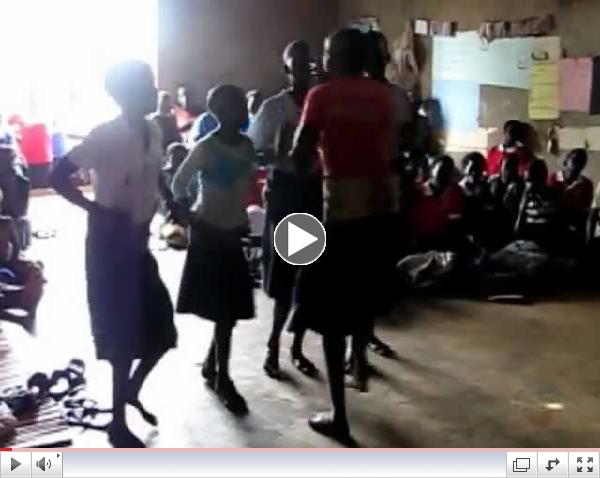 | | Drummers and Dancers in WMI Atiak Loan Hub |
| |
Loan Hub Visits.
Gulu-Driving 6 to 8 hours over dilapidated roads, we were greeted by all of the local coordinators and they testified about their businesses and what the loan program means to the women of Gulu. Many are widows or victims of the 20 year insurgency (now ended), who are trying to rebuild their lives. We visited a farm where a borrower and her husband had received help from Heifer to build a bio-gas generation unit. It uses animal waste to power cooking and lighting and was really quite ingenious. The family credited WMI with providing extra capital to expand their farm operations.
WMI's partner in the Gulu loan hub, Childcare and Development Organization - Uganda, has obtained an industrial milk pasteurizer and now has a small shop right in Gulu. The pasteurizer was acquired from a bankrupt farmer's co-op and operates for the benefit of local farmers. Many of the women in the loan program in Gulu received cows from Heifer Project and now have a place to sell their milk. The women would like to increase the number of cows that they have and develop the dairy products business.
Below:Hope Okeny, who help manage the Gulu loan hub, posed outside the Milk Matters shop and inside with the pasteurizer
 
|
|
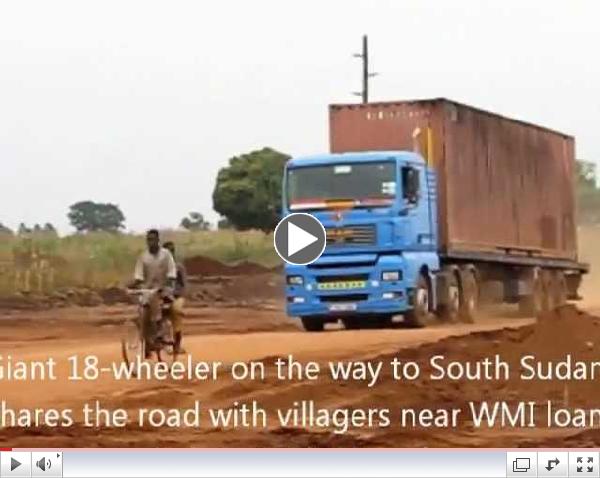 | | WMI Atiak, Uganda Loan Hub Traffic |
| |
Atiak - This village is in the extreme north of Uganda. It suffered enormous losses during the 20 year insurgency which ended 5 years ago. Just 15 miles from the South Sudan border, it has now turned into a major thoroughfare for all products being shipped to that resource-starved country. Electricity is extremely limited and so is other infrastructure, like water. This was WMI's first annual visit to Atiak and the women were so excited to host us. They turned it into a wonderful and well-deserved celebration. We were treated to exceptional drumming and dance performances. Catherine, the star dancer in the short video clip on the side bar, lost her father to the insurgency fighting. Her mother is a widow and a WMI borrower.
The Atiak loan hub was started in April 2012 through the efforts of Hannah Kahl, WMI's wonderful Resource Fellow, who is serving a one year term with the WMI loan program. There are four groups here now and all are doing extremely well. Because of the trade with South Sudan, the dirt track that was the main road is being expanded into a four lane highway. Right now it is a muddy traffic nightmare. As you can see in the video, pedestrians and overloaded bicycles share the roadway with giant 18 wheelers.
The Atiak loan groups are saving extremely well and women testified how they now think more about how to make money. Husbands are extremely involved in the businesses. Women testified that they are keeping their children in school by paying school fees. They performed an original drama about how the loan program has improved their lives. We were also treated to the spectacular traditional dancing and drumming performed by a youth ensemble of very talented young men and women whom we were lucky to videotape!
Bududa and Konokoyi - In the midst of the graduation ceremonies we were able to visit with the loan program leaders for these hubs. Both hubs are doing well and graduating women to bank loans on a regular basis. The Bududa ladies, on their own initiative, had acquired a piece of land to construct a WMI office. Imagine their pride when they presented us with the paperwork!

In Konokoyi, WMI partner Bududa Learning Center had started building a small office for WMI this fall when it was expanding its own operations. It was with great pride that WMI's Head Administrator, Betty Bigale, ushered us into the just completed WMI building - our second office in Uganda.

Kenya. My husband, Malcolm Stevenson, joined me for the Kenya portion of the trip. This was his third visit to WMI loan program hubs. He made an impact on the ladies because they all commented how supportive he was to travel to visit their remote locations. This gave them an easy way to start talking about their own husbands and how helpful they are in supporting their businesses.
Some hardworking Maasai ladies in the Kenya loan hubs
  
We were accompanied to the Kenya loan hubs in Ntumburi and Ngaendare by Kiama Karmushu. He was responsible for linking WMI supporter Elissa Eva to our first loan hub in the Meru area. He and his wife, Fatima Hussein, are providing administrative guidance to these loan hubs. These are new hubs - Ntumburi launched last July and Ngarendare just started in January.
Below: Pamela, Head Administraor for the Ngarendare loan group, and Karmushu in front of Pamela's shop.
 
This area of Kenya is extremely dry and accessing water is a huge challenge. Many of the women's business challenges center on acquiring sufficient water.
In Ntumburi, almost every one of the 20 women who got their first loans last July wanted to provide a testimony. Their businesses are doing well, despite extreme poverty and lack of water in the area. Several women had business strategies where they bought water for their crops and were able to sell their crops at a very high price. One borrower who was using her loan to irrigate her tomatoes and onions had made enough profit in six months to buy a home solar system, a television, and pay her children's school fees. She had quite a success story and the other ladies in her loan group cleanly admired her ingenuity.
Below:Naomi Kanene talks about irrigation as her neighbor, Margaret, poses ...
 
Banking - WMI's relationships are very solid. PostBank continues to provide excellent service. The Branch Managers treat the ladies in the WMI loan program with respect. Staff is attentive in assisting new borrowers with bank policies and procedures.
Below: Olive, far right, Grace and Falaska complete paperwork at PostBank Mbale, while in the background a graduating group receives bank loans
 |
|

Children's Thank you Letter | |
Impact on Children - During the trip numerous borrowers from all different geographic areas testified that one of the highest priorities for use of business profits is the payment of school fees. We talked to borrowers about how the improved opportunities for their children through a better education had brightened their own outlook on the ways in which they can proactively enhance the quality of life for their families. Children and adults alike discussed how children assist with their mothers' businesses and how children handle major chores to help the household run smoothly. The girls especially took pride in their contribution and Charity, Martha and Jemima, children of WMI borrowers, gave us a demonstration of how they help with chores and businesses.
We spoke to many children of WMI borrowers during the trip. The WMI loan program has become a part of their lives both through their mom's businesses and becuase many of their mom's work with progrm administration! Borrowers' family members' - small children and young adults alike - were enthusiatic about telling us the value of saving and working hard to make a business successful.
Several wrote heartfelt thank you letters to WMI. Thank you letter.
Buyobo Primary School - The school board prepared a two-hour presentation to show us how WMI's intern program has significantly improved academic performance. This year, every student but one passed the secondary school placement exam.
Once again, the teachers were extremely grateful for the support that WMI provides for the Tea and Bun program for teachers. WMI also supports a lunch program from P6 and P7 students. Last year we assisted in installing solar power in the three new classrooms the interns built and in providing a supplement so the teachers could buy practice tests for the students and tutor them in the evenings. The food program plus the books, solar, and intern tutoring have all contributed to the huge improvements in student performance. The 2012 performance was the best ever in recent memory. The teachers were so proud to present the exam grades to us. The greatest percentages of students were in the second and third highest categories. They indicated teachers are now more motivated than ever.
Medical Services - There were some interesting developments on the health care front. Buyobo, the first WMI loan program village and location of WMI's HQ, has become relatively prosperous. New shops and permanent houses are being built. The for-profit, private clinic that used to be about 6 km away has relocated - to 1 km behind a strip of shops on the main road. I asked our borrowers if they use the private clinic and the answer was overwhelmingly "yes". I asked if it was difficult to pay for treatment. The answer was overwhelming "no". Thirty borrowers have been keeping health notebooks and indicate they use their business profits or savings to pay for healthcare.
In addition to the clinic, one WMI borrow who is a nurse, started a drug shop several years ago. She has just added on a "consult" room and hired a doctor in Mbale to come to Buyobo every Friday and Saturday. She thinks her new room is big enough for 2 beds and is planning on keeping patients overnight if they need it. Another WMI borrower has a drug shop across the street from the nurse's, but is not a nurse herself, so does not provide advice - people view her as having less medical knowledge and they go to her shop when they already know what is wrong and just want to acquire a treatment.
It appears that the local medical marketplace has sorted itself into 3 levels of healthcare with 3 different pricing options to meet the needs of the local community, which is prospering through the businesses started with WMI loans.
 | |
Robyn with John Kinoti and Purity Mwende - community development at Lewa |
Collaboration with Other NGOs - One of the many excellent aspects of the trip was the opportunity to meet with other NGOs that have a similar missions and goals. We had an excellent meeting with The Hunger Project, which focuses on a holistic approach to poverty alleviation. THP has a microfinance component and we talked about ways we might be able share expertise. We traveled 4 hours to Soroti to visit The Village Enterprise Fund and learn about their agricultural initiatives. WMI Coordinators chatted with their counterparts at VEF about different approaches to program challenges.
Through the efforts of Carmelo Cocuzza of FinAfrica, we were able to meet up with The Samaritans of Gulu and Watoto Kecel. This is an Italian NGO that has a wonderful facility where HIV positive women are taught to manufacture handicrafts sold in a store in their compound. They also have a small microfinance program. We hope to be able to coordinate with them on future trainings. We also met with The Microfinance Support Center, a government organization that provides business development services and financing to member-owned savings co-operatives in Uganda. In Kenya, we met with the community project directors for the Lewa Wildlife Conservancy and have excellent prospects for utilizing their training resources.
The Fabulous Hannah Kahl - A highlight of the trip was working with WMI's Resource Fellow in Buyobo, Hannah Kahl. Hannah started with the WMI loan program last April and has become a beloved member of the Buyobo team. She has excellent organizational skills and is a keen community development strategist. She has been a wonderful resource for the loan program.
 | | Hannah receiving a thank you gift in Mutufu for all her hard work |
|
|

Current Loan Status
| |
End note. The ladies in the loan program continue to perform beyond all expectations. We have given them the responsibility of developing local operations and they have not disappointed! The local staff running WMI operations is continuously developing their administrative capacity so that the program can continue to expand to bring the benefits of village-level training, loan capital and support to increasing numbers of impoverished women in East Africa. The ladies are extremely grateful for the loan program and take the opportunity of WMI's annual visit to show their gratitude in abundance! Personal testimonies continue to demonstrate the impact the loan program is having in improving household living conditions. The WMI network is growing steadily and that has the potential to attract new resources that can amplify program outputs.
All of this wonderful progress is due to your contributions. In just five short years, you have made WMI into a successful grass-roots loan program operated by and for village women. Thank you for your generosity and support!
|
|
|
|
 |
Thank you! |
| | |
Each of you reading this Newsletter has helped make WMI a success. On behalf of all the rural women of East Africa that WMI serves: THANK YOU! With your continued support, we look forward to bringing the benefits of the WMI loan program to even greater numbers of impoverished women in 2013 so that they can create a better life for themselves and their families.
Gratefully,
The WMI Board of Directors
Robyn Nietert rgnietert@aol.com
Betsy Gordon betsygord@mac.com
Deborah Smith deborahwsmith@yahoo.com
June Kyakobye junekyaks@yahoo.com
Trix Vandervossen bvandervossen@imf.org
Jane Erickson ericksonjn@verizon.net
Terry Ciccotelli terryciccotelli@gmail.com
|
|
|
|
|
|